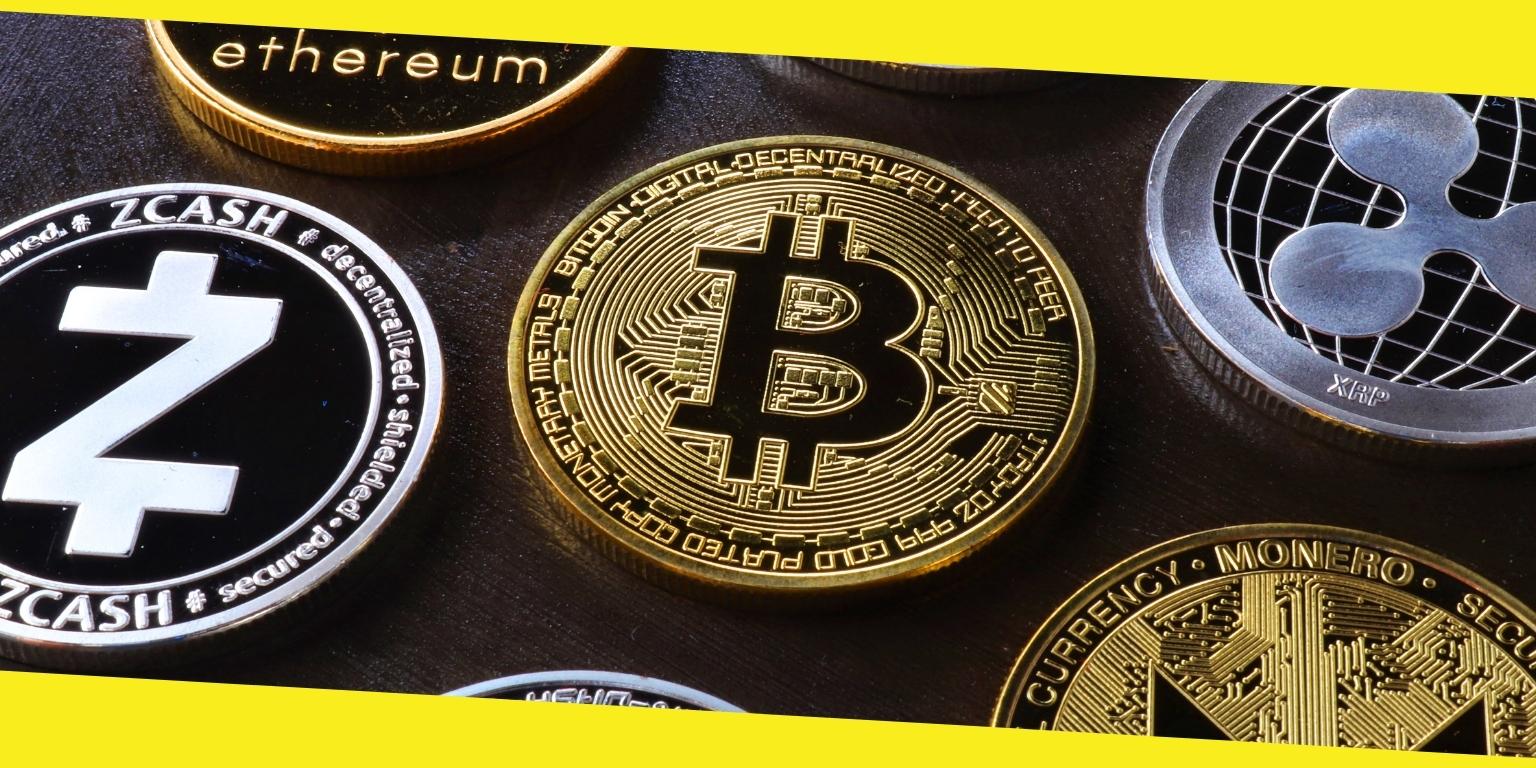All You Need to Know to Make Sense of Cryptocurrencies and Bitcoin!

A cryptocurrency is a digital medium of exchange that uses encryption techniques to control the creation of monetary units and to verify fund transfers. It makes it easier to conduct various financial transactions that are safe and secure.
Bitcoin is a cryptocurrency-based digital currency. Unlike government-issued currencies, it is governed by a decentralized authority. It was designed primarily to speed up cross-border transactions, reduce government control over trade, and simplify the entire process without the use of third-party intermediaries. Blockchain is a distributed ledger that enables low-cost, safe, and secure peer-to-peer transactions. Furthermore, it makes the information available to the public, allowing anyone to access and view the completed financial transaction.
Bitcoin – Frequently Asked Questions
Bitcoin operates as a peer-to-peer virtual currency. What does this imply?
The term “decentralised” refers to the fact that there is no overarching body that regulates bitcoin transactions. Instead, bitcoin follows a majority-rules principle, which states that a transaction is not valid until at least 50% of the machines on the network have verified it. ‘Peer-to-peer’ refers to the ability to send bitcoins to other network users without the use of a middleman, such as a bank or third-party payment mediator. Instead, you could say you wanted to buy a pizza with bitcoin and see who was willing to sell you pizza while accepting bitcoin as payment. The term “virtual currency” refers to the absence of physical, tangible bitcoins. There are no metal bitcoins that you can hold in your hand like US cents or British pound coins, and they’re likely will never be. Instead, each new bitcoin is created entirely digitally.
Currently, if you need to transfer funds to someone, one option is to give cash or to use a trusted intermediary (for example, a bank). Both mechanisms, whether physical cash (guaranteed by the country’s central bank) or electronic transfer, involve an intermediary (in the latter case, a bank or another financial institution). There are transaction costs when intermediaries are involved.
Blockchain technology aids in the elimination of intermediaries by substituting cryptographic proof for the trust that intermediaries bring to the table through the use of CPU computing power. Bitcoin incorporates cryptographic trust via a wallet, a public key, and a private key. By downloading the Bitcoin programme, anyone can create a free Bitcoin wallet. Each wallet contains both a public and private key. The public key functions similarly to an address or account number through which anyone can receive Bitcoins. A private key functions similarly to a digital signature in that it allows a person to send Bitcoins.
Bitcoin transactions are verified using cryptography by telecommunication network nodes and then recorded in a decentralised distributed ledger known as a blockchain. This is one of the characteristics that distinguishes Bitcoin from other crypto assets, where there is a centralised exchange, similar to a stock exchange, through which all transactions must be routed or validated.
Is bitcoin a real currency?
It is debatable whether Bitcoin is a currency at all, and why any country would want to replace it with their existing currency, given that Bitcoin has no intrinsic value. A currency is defined as “a system of money in general use in a specific country” or “the fact or quality of being generally accepted or in use.” There is currently some traction in the number of companies using Bitcoin as a mode of payment, but no major country or economy has accepted it as money in general use. Another critical aspect is Bitcoin’s acceptance as a global payment mechanism that is not tied to any particular country’s currency and thus is not directly impacted by developments within that country.
Why is the price of bitcoin so volatile?
Bitcoin is an extremely valuable cryptocurrency. It sits at the top of the cryptocurrency market because it has the highest market value and the highest rank in terms of market capitalisation. It is also a pioneering cryptocurrency and therefore has immense long-term potential for people who are interested in getting involved in the world of cryptocurrency and trading. Finally, there is a finite supply of bitcoins, so the price of bitcoin is heavily influenced by fluctuations in the demand. Bitcoin’s price is volatile due to shifting supply and demand factors. In recent years, the coin’s demand has fluctuated dramatically.
While supply is less important than demand in explaining the coin’s volatility, it is no less important. In this context, supply does not refer to the total number of bitcoins available for mining, but rather to the total number of coins currently being traded on the market.
Changes in the supply of coins that are currently being exchanged and traded, rather than those that are being held onto, can have a significant impact on the current market price of bitcoin. In the bitcoin world, for example, ‘whales’ are people who have a large number of bitcoins. If one of these whales decided to dump their coins into the market, the sudden and dramatic increase in supply would almost certainly cause the price of bitcoin to fall and volatility to rise. This assumes that demand remains constant. The sudden increase in coins available for exchange would increase liquidity, which would have an impact on bitcoin’s volatility. This is due to the fact that the market for buying and selling coins directly is typically illiquid in comparison to the market for trading on bitcoin’s price movements, but the current market price of bitcoin is based on the market for buying and selling coins directly.
What is bitcoin used for?
People buy bitcoin because they are bullish on its market prospects. When it comes to the price of bitcoin, optimism isn’t always misplaced. Given the coin’s inherent volatility, dramatic price increases can occur in a very short period of time. People who choose to buy bitcoin are betting on increased demand in the coming years, as there is a finite supply of bitcoins available (capped at 21 million). This, combined with a limited supply, would cause the price of bitcoin to rise, implying that bullish market participants could stand to profit handsomely if their predictions prove correct.
Bitcoin is used as a currency in a wide range of transactions. Travel agencies, food dispensaries, and the Xbox marketplace are just a few of the businesses that accept bitcoin as payment. Bitcoin also attracts speculators who want to bet on the cryptocurrency’s future price movements. This entails using derivatives to trade bitcoin’s price movements in an attempt to profit – without owning any of the underlying coins or becoming involved in the intricacies of the Bitcoin network. While there are some places where you can spend bitcoin, many people prefer to keep it as a long-term investment. The price volatility of bitcoin makes day-to-day purchases difficult – though a handful of crypto-powered debit and credit cards are beginning to change that.
What are the ways to make profits from bitcoin?
Purchasing bitcoin through an exchange gives you direct ownership of physical bitcoins. As a result, if the price of bitcoin rises, you will profit. If the price of bitcoins fell below what you paid for them, closing your position would result in a loss. People will purchase bitcoin through an exchange in order to use it in network transactions. They can be added to a bitcoin wallet, and if accepted by the vendor, you will be able to use them as a form of payment with other network users.
Trading bitcoin derivatives entails speculating on bitcoin’s current market value using financial derivatives such as spread bets and CFDs. You will not acquire any bitcoins, and they will not be added to the balance of your bitcoin wallet if you have one. However, one of the most common ways for people to gain exposure to the bitcoin market price is through the use of derivatives. They can speculate on the price rising by going long, or they can speculate on the price falling by going short.
If you want to mine bitcoin for a profit, you should consider the operating costs and likelihood of payoff if you set up your own mining system. The risk is that you will spend a lot of money on computers and electricity but will have a low chance of being the first to generate a block’s hash, which means you may not receive any rewards. As a result, many miners will pool their resources to increase their chances of success. A mining pool is a group of individual miners who work together to increase their chances of being rewarded with bitcoins. Nodes, which are computers that connect the Bitcoin network, then keep track of those blocks in order for them to be verified in the future.
The cryptocurrency market is extremely volatile. As a result, Bitcoin is subject to market volatility. Much like any other investment, there are risks associated with bitcoin but if you are determined to invest in bitcoin, Swyftx can help you out. Swyftx is an Australian cryptocurrency exchange with numerous features and benefits that make it simple to buy and sell Bitcoin. They have low trading fees for those who want to trade cryptocurrency, which means you can maximise your profits and keep more money in your pocket. If you are new to the world of cryptocurrency and you don’t know where to begin, you can use their exchange to help you. They even offer a demo mode, to help you practise trading before you start making any major investments, which helps you safeguard any bitcoin that you have in your possession. If you want to start investing in cryptocurrency but are confused as to where to begin, you can click here to get started with the crypto exchange.
Recommended For You
The Science Behind Content
Most Inside
Most Inside offers high-quality recommendations and valuable updates to enhance all aspects of your life, providing premium guidance and enriching experiences.




